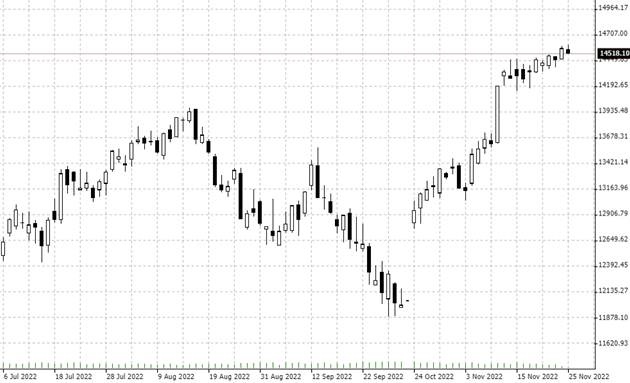

25.11.2022 – The round has to go into the square and before the game is after the game. Every four years, the country is buzzing with platitudes about the World Cup. And there is also the question of whether the soccer match has an impact on the stock market. In fact, there are one or two experts who claim that it does. Especially in the case of disappointments. Which brings the DAX into focus for us.
If what you read below is true, then the DAX is facing a major short opportunity. Because after the 0:12 against Spain on Sunday, the frustration should be discharged quite violently. Which would then perhaps end the upward trend in the daily chart. But joking aside: In fact, according to experts, there are good reasons for traders to keep an eye on the World Cup.

Source: Bernstein Bank GmbH
For example, Professor Alex Edmans, once of the Wharton School, University of Pennsylvania, now of the London Business School, concluded in his paper “Sport Sentiment and Stock Returns” after researching 39 states that there is indeed a correlation between asset prices and soccer.
World Cup exit sinks prices
While the paper dates from 2007, Mr. Edmans teaches at top addresses, so we shouldn’t ignore him. Specifically, it says: “elimination from a major international soccer tournament is associated with a next-day return on the national stock market index that is 38 basis points lower than average.” In other words, the frustration continues on the stock market. To be sure, his research doesn’t give anything for the bulls: “We find no evidence of a corresponding effect after wins for any of the sports that we study.”
Small exchanges with local stocks suffer
But for the bears, he does have fodder: “we are able to reject the hypothesis that the loss effect after soccer games is driven by economic factors such as reduced productivity or lost revenues.” And then he gets even more specific: “the effect is stronger in small stocks, which other studies find are disproportionately held by local investors and more strongly affected by sentiment. Overall, our interpretation of the evidence is that the loss effect is caused by a change in investor mood.”
Radio silence on games
The Straits Times, unfortunately without citing sources, adds that in the first month after a World Cup final, seven of nine loser’s stock markets performed 1.4 percent below the global average. Over the next two months, the bear market continued, with a relative loss of 5.6 percent. What’s more, he said, vola is falling: in one case, the number of trades on the Chilean stock market fell 83 percent during a World Cup match. In fact, Latin American stock markets in particular reacted to the games. The plunge in trades starts before the match and lasts up to 45 minutes after the match, he said. Further, there would be a dip in trades of 5 percent on a goal. In general, relevant news for the stock market during soccer would be processed much later than normal.
Even a minus in the SPX
Even for the U.S., Israeli researchers Guy Kaplanski and Haim Levy found a correlation in 2008. In their study “Exploitable Predictable Irrationality: The FIFA World Cup Effect on the U.S. Stock Market,” they analyzed data from 1950 to 2006. According to the study, the S&P 500 Composite Index recorded a return of minus 2 percent during the tournament. We think this is astonishing, given that the disinterest in soccer is traditionally even greater in the U.S. than it is here in Germany.
Our conclusion: Psychology is at work on the trading floor during the World Cup. And in the event of disappointment, selling pressure is on the cards. Brokers are probably not mentally in a position to deal with shares for the time being. And that’s why the inclination to buy dries up, especially in small stock markets with strong national investment. Now that’s a truly concrete tip for traders and investors: Keep an eye on equity markets where teams are disappointing in the World Cup. However, the big factors remain: Liquidity and investment pressure in funds, monetary policy and inflation/recession. Bernstein Bank wishes successful trades and investments!
__________________________________________________________________________________________
The content of this publication is for general information purposes only. In this context, it is neither an individual investment recommendation or advice nor an offer to purchase or sell securities or other financial products. The content in question and all the information contained therein do not in any way replace individual investor- or investment-oriented advice. No reliable forecast or indication for the future is possible with respect to any presentation or information on the present or past performance of the relevant underlying assets. All information and data presented in this publication are based on reliable sources. However, Bernstein Bank does not guarantee that the information and data contained in this publication is up-to-date, correct and complete. Securities traded on the financial markets are subject to price fluctuations. A contract for difference (CFD) is also a financial instrument with leverage effect. Against this backdrop, CFD trading involves a high risk up to the point of total loss and may not be suitable for all investors. Therefore, make sure that you have fully understood all the correlating risks. If necessary, ask for independent advice. CFDs are complex instruments and are associated with the high risk of losing money quickly because of the leverage effect. 68% of retail investor accounts lose money trading CFD with this provider. You should consider whether you understand how CFD work and whether you can afford to take the high risk of losing your money.7
